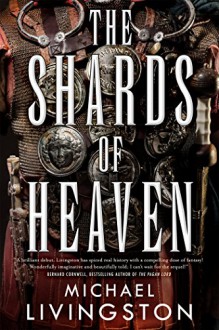
The Shards of Heaven is a wonderfully written work of historical-fiction; one which is able to evoke the awe and majesty of the final days of the Roman Republic while mixing in enough fantastical elements to create something fresh and original. Enjoyable alone, it is the first installment in The Shards of Heaven series and loudly proclaims a new voice in the genre, a writer whom we will all be reading for years to come.
The story begins immediately after the fall of Julius Caesar at the hands of disgruntled senators. Rome is in chaos; the specter of war looms over all. The figures at the center of the political maelstrom are Caesar’s grand-nephew and adopted son Gaius Julius Caesar Octavianus; his supposed biological son Caesarion by the Egyptian pharaoh Cleopatra; and his ally and a renowned general Marc Antony. Each of these titans of history playing a pivotal part in a dramatic assassination attempt immediately after Caesar’s death
Once the frantic beginning is done, Shards skips ahead in time to the period before the final war of the Roman Republic, focusing on Prince Juba of Numidia. This young man is another adopted son of Julius Caesar; his biological father having fought unsuccessfully against Rome in northern Africa and having died rather than be captured; and while Juba plays the dutiful Roman and subservient brother of Octavian, deep down he is neither, but rather a hater of Rome who is diligently plotting his revenge against it. A revenge which depends on him locating and wielding the god-like powers of the Shards of Heaven; an artifact which legend says is the Trident of Poseidon and perhaps the Staff of Moses.
While Juba’s quest proceeds, the narrative weaves a vivid picture of a Mediterranean world sitting upon the edge of a precipice; war seemingly inevitable, as Octavian eyes the eastern lands which Mark Antony and his paramour Cleopatra hold in trust for Caesarion and their own children. All that is needed is a spark to begin yet another war in the Roman Republic. A war which will sweep aside the old and usher in the new!
As a lover of history and a student of Roman history when I was in college many decades ago, my favorite aspect of Shards was its amazing portrayal of this epoch in time. The Mediterranean world literally comes to life before your eyes. The Rome Republic and Ptolemaic Egypt shown in their true historic brilliance. Dr. Livingston delving far below the surface of each to reveal their unique natures, distinct qualities, and the huge differences which separated them from one another. And for a few hours, I actually felt like I had walked in the streets of both Rome and Alexandria, which is something I will never forget.
Characters are the other highlight of this story. The faithful rendition of many familiar legendary players is extremely well-done. Octavian, Mark Antony, and Cleopatra literally burst off the pages here, mesmerizing in their grandeur and perplexing in their faults. But even more impressive than them were the other – lesser known – characters such as Caesarion, Juba, and Cleopatra Selene. Each of these youths grow before your eyes into living, breathing individuals caught up in titanic events, desperately attempting to live through it all, and it is through them (more than their more well-known co-stars) that Shards’ real story shines.
My only criticism of the novel would be its assumption that readers have a rudimentary understanding of this period of Mediterranean history. As I mentioned, the beginning is fast and furious, introduces the names of Cleopatra, Caesarion, Mark Antony, and Octavian, but then fast-forwards ahead to a world where Octavian rules in Rome and Mark Antony and Cleopatra rule in Egypt. How all this occurred isn’t really explained except in the most basic ways. Not knowing how Octavian and Antony and Cleopatra arrived at this moment in history won’t necessarily keep you from enjoying Shards, but it does make it a tad bit more difficult to understand why these people are acting as they are.
Fantastical elements, engaging characters, a vivid world and a fast-moving plot, Dr. Livingston has endowed The Shards of Heaven will all these elements — and many more. It really is a historical-fiction novel which should not be missed, and I’d highly recommend all lovers of intricate, epic stories to give this amazing novel a try.
I received this novel for free in exchange for an honest and unbiased review. The thoughts you have read are mine alone.

 Log in with Facebook
Log in with Facebook 





